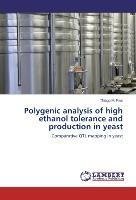
-
 Anglický jazyk
Anglický jazyk
Polygenic analysis of high ethanol tolerance and production in yeast
Autor: Thiago M. Pais
High ethanol accumulation capacity and high ethanol tolerance are crucial in several industrial applications (Kerr, 2010). Identification of causative genes underlying those polygenic traits have being cumbersome to perform and novel methodologies to facilitate... Viac o knihe
Na objednávku
71.19 €
bežná cena: 79.10 €
O knihe
High ethanol accumulation capacity and high ethanol tolerance are crucial in several industrial applications (Kerr, 2010). Identification of causative genes underlying those polygenic traits have being cumbersome to perform and novel methodologies to facilitate the studies of industrial yeast strains are aspired (Mackay et al., 2009). We have screened 68 different yeast strains in very high gravity fermentations and we have identified a diploid sake strain that produces 18-19% (v/v) ethanol. This strain is able to accumulate nearly 21% (v/v) ethanol when continuous stirred fermentation is performed using YP + 35% glucose. The diploid Sake x BY4742 was sporulated and the meiotic segregants were phenotyped and genotyped on plates containing ethanol and by small scale fermentations. The determination of the genotypes was done by pooled segregant whole-genome sequencing. Applying a Hidden Markov Model approach to map the QTLs we found 8 being linked to maximal ethanol accumulation capacity and 7 QTLs involved in high ethanol tolerance. Reciprocal hemizogosity analysis in two QTLs revealed some causative genes involved in high ethanol accumulation capacity.
- Vydavateľstvo: LAP LAMBERT Academic Publishing
- Rok vydania: 2013
- Formát: Paperback
- Rozmer: 220 x 150 mm
- Jazyk: Anglický jazyk
- ISBN: 9783659475788












